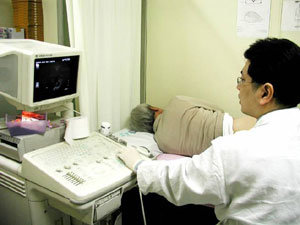Hormone Therapy Gives Hope to Prostate Cancer Victims
Hormone Therapy Gives Hope to Prostate Cancer Victims
Posted October. 17, 2004 23:07,

A 55-year-old man identified as A, a former Japan Self-defense Force, has been fighting against prostatic carcinoma. His prostate-specific antigen (PSA) figure exceeded 1,600. Normally, if ones PSA is higher than 4, it is suspicious that the person may have cancer, and doctors recommend detailed physical exams.
Cancer cells had already metastasized into his bones and even into his lungs. The pains he had were serious, but the prediction that he might die within five years was harder to handle. His doctor prescribed hormone medications along with the treatments.
About two years after he started hormone medications, a miracle happened. Most of the cancer cells in his body disappeared and his PSA number went down to 0.08.
This was an example of medical treatments reported at the 27th Society of International Urology (SIU) conference held in Honolulu, Hawaii earlier this month. A large number of hormone treatment cases were discussed at this years conference, where some 50,000 urologists attended. There were also many opinions that there should be more efforts in preventing and diagnosing early prostatic carcinoma.
Early Diagnosis Rare in South Korea--
As regular physical checkups have become popular in South Korea, many prostatic carcinoma cases have been found in their early stages. However, many reports presented by the conference showed the rate of early diagnosis in South Korea is low compared with other countries such as the U.S., Europe, and Japan.
In the U.S. and Japan, where PSA tests are popular, 70~80 percent are found in to be at an early stage of the cancer, and most of the rest are also found to be in the transition stage from early to middle.
Meanwhile, 50-60 percent of South Korean prostatic carcinoma patients discover their cancer after metaphase. There are also a not-so-ignorable number of cases found in the last stage.
Early-stage cancers stay inside the prostate only and can be completely cured by removing the infected areas through an operation that leaves no problems with the sexual function of the patient. But mid-stage cancer has about a 25 percent recurrence rate even after surgery and requires radiation therapy.
Hormone Treatments Augment Quality of Our Life--
Hormone treatments mean blocking male hormones to delay the growth of cancer cells. Hormone therapies have been used in South Korea, mostly as a supplementary treatment when cancer has metastasized into bones or the pains are too severe, or after surgery.
Many countries at the conference such as Israel and the U.S. reported that hormone therapies reduce pain and augment quality of life as well as increase life expectancy. They say that the quality of life has been noticeably improved by hormone therapies, although they do not completely cure the disease.
Furthermore, Japan has recently been trying to cure diseases completely by hormone therapy. Currently, about 60 percent of early stage or mid stage prostatic carcinoma patients are being treated with hormone therapy in Japan. The rate is 20 percent in the U.S.
Hormone treatment medications currently sold in South Korea are Casodex, Eulexin, and Androke. A patient can take just one pill of Casodex a day.
Tasks to Be Done--
Although these hormone medications can result in quick improvements in symptoms, long-term use may cause such side effects as sexual malfunction, depression, a red face, osteoporosis, and liver damage. As a result, research to reduce such side effects has been going on aggressively.
Patients may also develop resistances to these hormone medications, and they may stop working after being taken long term. There have been various researches going on to decide how much and how long these hormone medications should be taken for maximum efficiency.
Sang-Hoon Kim sunjung71@hotmail.com







